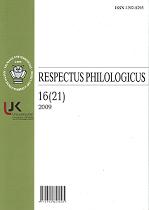СПОСОБЫ ВЕРБАЛИЗАЦИИ КОНЦЕПТОВ КАК ПРОБЛЕМА КОГНИТИВНОЙ ЛИНГВИСТИКИ
THE WAYS OF REPRESENTATION OF CONCEPTS AS A PROBLEM OF COGNITIVE LINGUISTICS
Author(s): Zinaida D. PopovaSubject(s): Language and Literature Studies
Published by: Vilniaus Universiteto Leidykla
Keywords: концепт1; лексическая вербализация2; фразеологическая вербализация концептов3; синтаксические концепты4; морфологически репрезентированные концепты5;
Summary/Abstract: The problem of verbalization of concepts is one of the k�ey problems of cognitive linguistics. Ac seological units is studied and combinations of lexemes ranging from free to idioms are viewed. In the article, the matrix of possible combinations of denotative sememes (Д1 – a direct nominative word meaning, Д2 – a derived nominative word meaning) and connotative sememes (К1 – motivated connotative meaning, К2 – unmotivated connotative meaning, К3 – isolated connotative meaning) is presented. The conclusion is drawn that all types of phraseological units (except the free ones) represent the same types of concepts as univerbs (cogitative pictures, schemes, frames, cording to Kubriakova, concepts are cogitative images making up the conceptosphere of the person, quantum of knowledge. Such concepts, which are discussed extensively, acquire language nominations and are verbalized, are called communicatively demanded. Currently cognitive scientists discuss problems of verbalization of concepts by lexemes (lexical concepts), compound nominations and phraseological units (phraseological concepts), block schemes (syntactic concepts) and morphemes (morphological concepts). The article focuses on the ways of representation of concepts by lexical means in the form of cogitative pictures, schemes, frames and scripts (Babushkin, 1996). The question of ways of representation of concepts by means of phraseology is discussed. The typology of phra ЛИНГВИСТИКИscripts and others). The theory of syntactic concepts, i.e. structures, represents typical situations of the objective world reflected by the consciousness of the person. Alongside, syntactic concepts of the Russian language are studied in detail and Indo-European concepts are differentiated.
Journal: Respectus Philologicus
- Issue Year: 2009
- Issue No: 16 (21)
- Page Range: 56-61
- Page Count: 6
- Language: Russian

